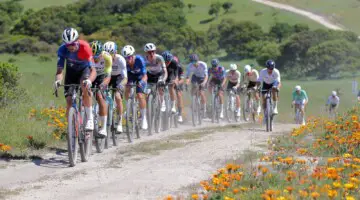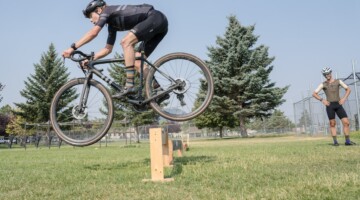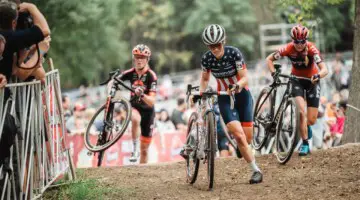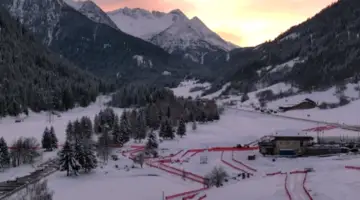The past two weeks have been all about America. It’s been a highlight of my season since my first visit which I think was in 2009. A crowd that cheers for everyone, but remains proud of their own. Family-friendly atmospheres, forward-thinking organizers and refreshingly different ideas like mini-Belgians’ races and Doggie ’Cross.
What’s not to love? Well, there are some things that I need to address on the good and bad.

There were good things in Iowa, including a win by Helen Wyman on Friday night. 2018 Jingle Cross Day 1. © D. Mable/ Cyclocross Magazine
Controversy on the Mic
First, I have to mention course announcers and misogynistic comments. As a victim of those comments myself, suggesting I’m past my prime and too old, I want to say how pleased I was with the swift action taken by John Meehan as the organizer of the event.
There isn’t a place for those comments in any sport, and I think compared to some I got off lightly. I had dinner with John on Sunday night after the races were all over. He’s a great guy, who’s always done everything he can to promote women’s racing in the same way as men’s. These comments didn’t reflect his values or those of any of the great people working in his volunteer team at the event. I’m sure we will never see a repeat.
As for calling me old, I can take that. I’m 37, but racers want to race. If you want to stop me racing, come and beat me. I’ll know when there isn’t a place for me in the sport.
Yesterday the UCI updated the World Ranking, and I’m 5th. I’m the 8th youngest in the top 10, and the average racing age of the top 10 is over 33. The first U23 rider is 14th in the ranking and only two U23 riders feature in the top 20. Women’s races would look like those abandoned towns you see in western movies on Sunday afternoon TV if you took us “old” ones out, so keep your negative comments to yourself and watch us race.
You might learn something.
A Case for U.S. World Cups
So that’s one negative addressed, now onto another; people saying World Cups in America shouldn’t happen. This generally comes down to arguments related to costs, but let’s try to put the story straight here in a few points.
Point 1: Last season the best World Cup in the season was voted for by all nations that participated and guess who won? That’s right, Jingle Cross in the U.S. So before we stop races in the U.S., let’s perhaps consider going there with our eyes open and learn something from them.
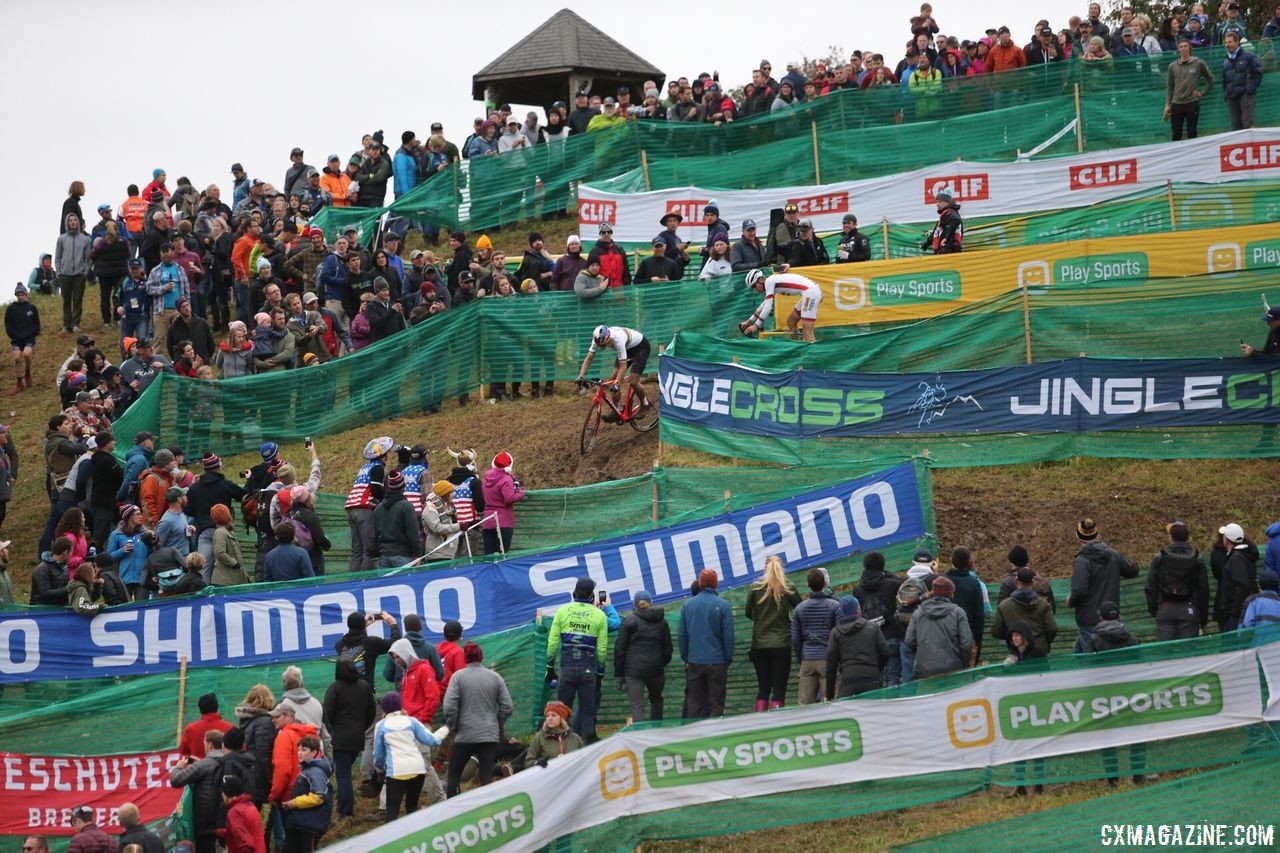
Jingle Cross was rated the top World Cup for the 2018/19 season. 2018 Jingle Cross World Cup. © J. Corcoran / Cyclocross Magazine
Point 2: It doesn’t actually cost that much. I paid €400 for my ticket, plus €200 for two bike bags to go. I needed a pit person, so talked the husband into coming along, that’s another €400 (Please note, many riders had local volunteer help, so that’s free). We pooled together with another rider, so that split the cost of a rental car—known as a hire car in the UK, thought my UK readers would want to know that). That’s €300 to add in.
Now the organizers helped out with finding host housing, so I had one night in a hotel. That was €100 as I used a comparison site and got a great deal at the airport. So that’s €1,400 for 2 weeks away—which included 5 races—with the luxury of my own pit person.
Now take the Czech Republic round of the World Cup, which will cost the same as that for one race. Denmark last year, more than €1,400. Then, don’t forget Belgium, where if I travel for a 2-week block of races, it’s a minimum of €2,000 without host housing.
If it’s costing too much, you’re likely doing it wrong. Now I will back this up and say two things: one, it’s a choice to go. If you don’t go, there are good examples that you can still rank highly in the overall series. Two, if you simply can’t afford it, you likely couldn’t afford other rounds either.
I’m deeply sorry our sport is so hard for riders, especially those outside Belgium and Holland. Support is damn hard to find, I know that as well as anyone. Uncertainty is huge, inequality is still there, and opportunity is often scarce. But don’t give up. Where there is a will, there is a way. There are people to help, and if you can’t find them, drop me a line.
Point 3: It’s a World Cup, hint is in the name. If I had it my way, no more than two events would be held in the same country in any World Cup season. Let’s get these races rotating, let make them financially viable, which I’ll touch on in a minute, and lets make it global with a far wider reach.
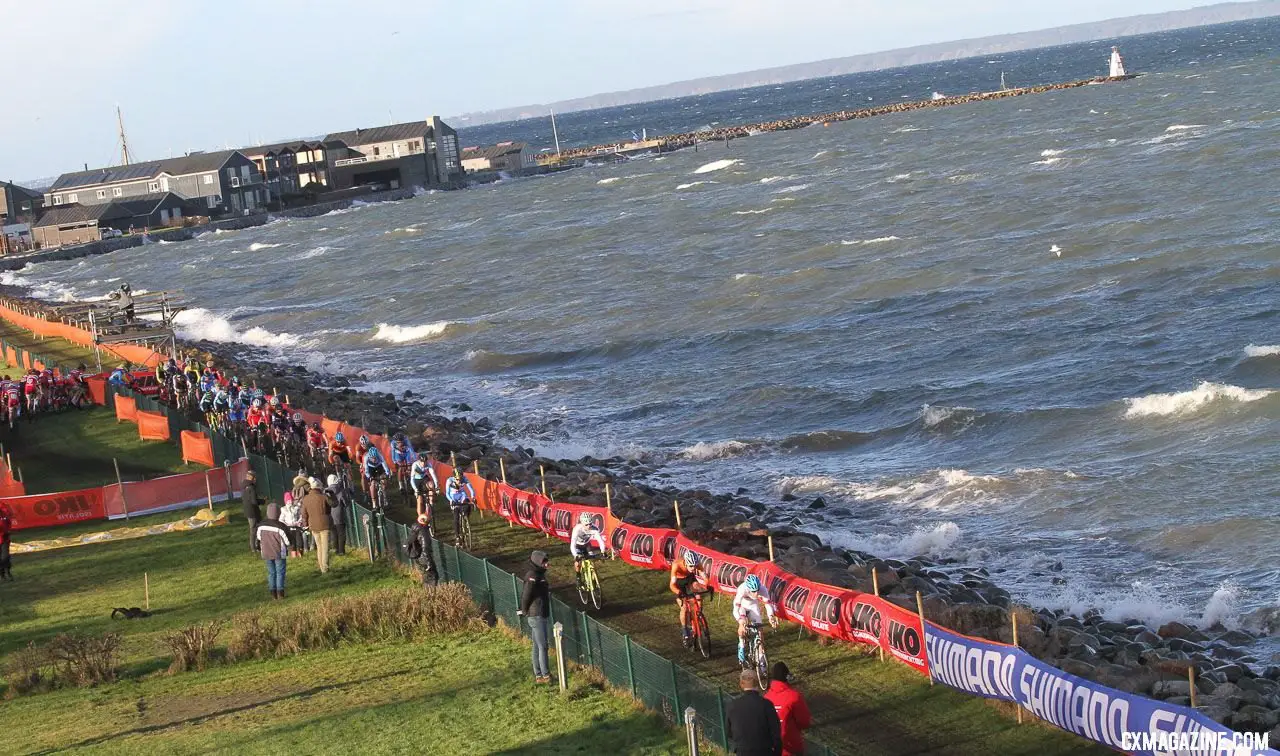
World Cups have taken cyclocross to new places in recent years. 2017 Bogense UCI Cyclocross World Cup. © B. Hazen / Cyclocross
Fixing Remaining Inequalities
So how do we fix the remaining inequalities? Some big steps are on the way. Junior Women’s Worlds, Junior Women’s World Cups and Junior Women’s races are to be made mandatory in UCI events in the near future (No definition of near available, but it’s near, I know that). It’s really exciting to think in not too long, we will have an equal set of races and an equal set of rainbow jerseys.
A big area to be fixed is equal prize money in World Cups, and we have a timeline now for that. However, there is a thirst for it to happen earlier.
Trek has stepped up with live streaming, factory teams in all areas apart from bike gymnastics, (the UCI Trek Factory Racing CX team is only women, but I’m not sure how I feel about the lack of opportunity for men in this to be honest, but that’s for another day) and of course the last two years a World Cup with equal prize money.
We must remember that Trek is huge, like totally massive, and of course awesome for doing all of this. I’ve never had a Trek, but I hope the support they’ve shown the sport makes people want to buy their bicycles.
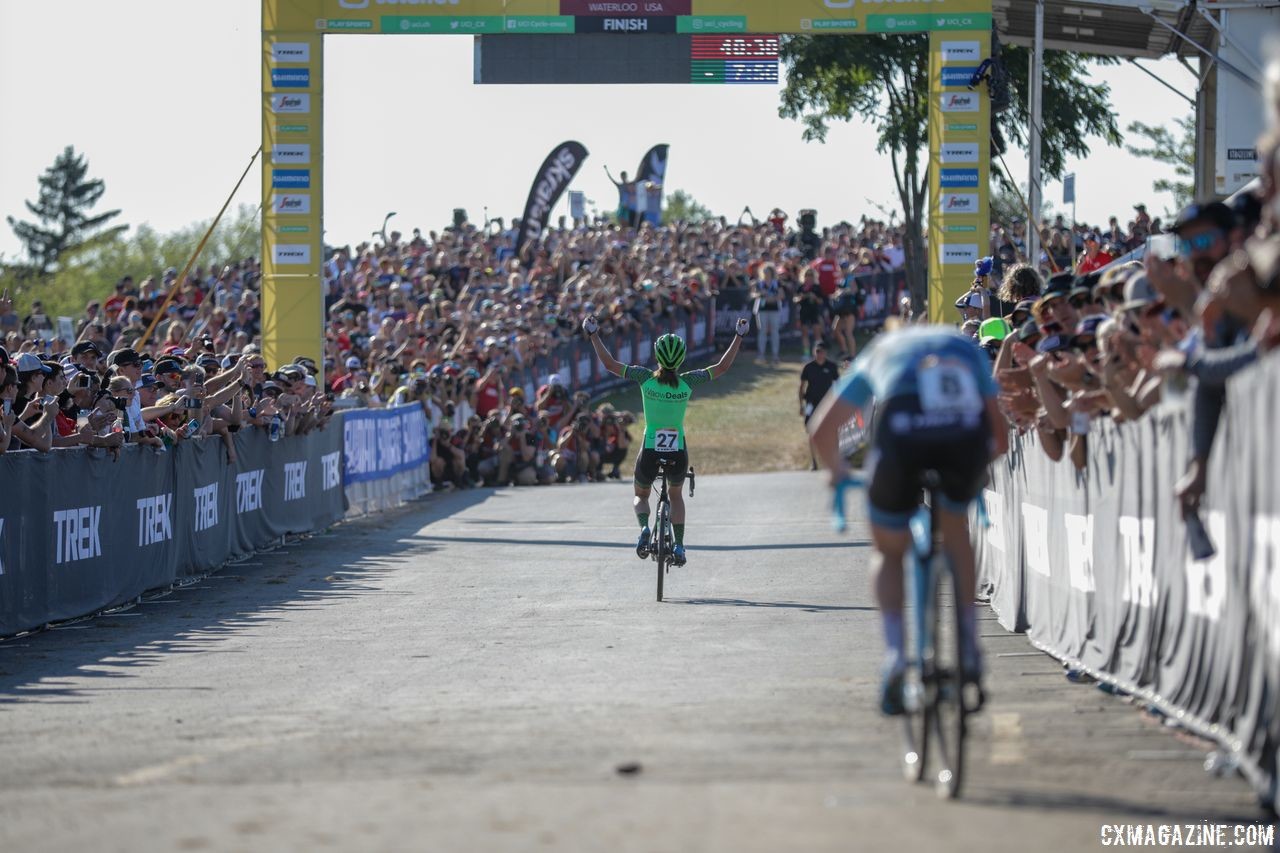
Trek got good crowds to come out for its World Cup. 2018 World Cup Waterloo. © R. Clark / Cyclocross Magazine
Other organizers aren’t quite so powerful, and rather than having a race backed by an industry giant, they are fueling it with passion and hope. Jingle is one of those races.
Outside of Belgium, the financial model for a World Cup doesn’t work, in my opinion. There needs to be a cheaper way to promote a World Cup, where the best races/promotions are placed into a World Cup rather than those that can afford it. Only in Belgium do we really see a crowd willing to pay €15 entry and also a crowd big enough to impact on the cost of staging the event. For a race in the Czech Republic or the U.S., gate receipts are around $0.
But the U.S. was 10 years ahead on equal prize money in C1 and C2 races, and I proposed to John at Jingle Cross that I lead a project to help raise funds and partners to meet the €30,000 shortfall between Men and Women’s prize money at his event.
So just to confirm, it’s €30,000 per round that the UCI minimum prize money is different for men and women. That’s a huge shortfall for anyone to find. I want to help make this change sooner than mandated, but I’m pretty sure it would be biggest #Helen100 challenge to date. Help appreciated, FYI.
Featured image: Dave Mable

